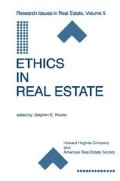Abstract
Many of the attempts to reintroduce professional ethics in real estate reflect sincere and well intentioned efforts but are flawed by the absence of a systematic philosophical understanding of the relationships that exist between professionals and the community. This lack of understanding is due to both the state of moral philosophy in the twentieth century and the tensions between the professions and the community. The essence of professionalism lies in the specialized knowledge required in an occupation that is impractical for most members of a community to appropriate or evaluate. A professional uses specialized knowledge in a way that is trusted, but not understood, by the community, which gives rise to the necessity for professional associations, self-regulation, and specific codes of ethics and also accidental qualities that have come to be associated with professionalism, such as status and income.
Historically, the medieval guilds offer the prototype for professional associations, and their relationship to the community provides insights into professionalism today. These are reviewed and separated from the historical distortions of the intervening centuries that still heavily color our contemporary understanding.
Real estate is one of the several occupational areas that have appropriated the income and status associated with the professions. An analysis of the other necessary qualities of professionalism offers a test to establish how earnestly these occupations seek genuine professional status, especially in a world where many established professions are adopting practices that are not genuinely professional.
Current trends in professionalism are located as the product of philosophical systems underpinning social changes broadly known as postmodernism. The implications of postmodern professionalism for the real estate occupations are considered with the cautions they naturally generate.
Access this chapter
Tax calculation will be finalised at checkout
Purchases are for personal use only
Preview
Unable to display preview. Download preview PDF.
References
Acquinas, Thomas. (1274/1920). Summa Theologica. Westminster, MD: Christian Classics.
Bernard, Francine, and Pierre J. Hamel. (1982). “Toward a Deprofessionalization of the Profession of Accountant? The Situation in Quebec.” Sociologie du Travail 24(2): 117–134.
Blaug, Mark, ed. (1991). St. Thomas Aquinas (vol. 3). Elgar.
Brazier, Margaret, Jill Lovecy, Michael Moran, and Margaret Potton. (1993). “Falling from the Tightrope: Doctors and Lawyers Between the Market and the State.” Political Studies 41(2): 197–213.
Dempsey, B.W. (1935). “Just Price in an Unjust World.” American Economic Review 25 (September): 471–486.
Duman, Daniel. (1979). “The Creation and Diffusion of a Professional Ideology in Nineteenth Century England.” Sociological Review 27(1): 113–138.
Durkheim, Emile. (1957). Professional Ethics and Civil Morals. Ed: led by W.J.H. Sprott. London: Routledge and Kegan Paul.
Fanfani, A. (1939/1955). Catholicism, Protestantism, and Capitalism. London: Sheed & Ward.
Foucault, Michel. (1976). “Disciplinary Power and Subjection.” In Colin Gordon (ed.), Selected Interviews and Other Writings1972–1977. Pantheon.
Helsby, Gill, and Murray Saunders. (1993). “Taylorism, Tylerism and Performance Indicators: Defending the Indefensible?” Educational Studies 19(1): 55–77.
Hurley, Neil. (1996). “Ethics and Ethical Behaviour in the Property Valuation Profession.” Appraisal Journal 64(2): 125.
Kronus, Carol L. (1976). “The Evolution of Occupational Power: An Historical Study of Task Boundaries Between Physicians and Pharmacists.” Sociology of Work and Occupations 3(1): 3–37.
Kurth, Godfriod. (1943/1978). The Workingmen’s Guilds of the Middle Ages. Translated by Denis Fahey and Stephen Rigby. Hawthorne, CA: Omni.
Langholm, Odd. (1992). Economics in the Medieval Schools: Wealth, Exchange, Value. New York: Brill.
Little, Lester K. (1978). Religious Poverty and the Profit Economy in Medieval Europe. New York: Cornell University Press.
Marx, Karl. (1867/1909). Chicago: Kerr Capital.
Mill, J.S. (1859/1978). On Liberty. London: Fount.
Moore, Nancy J. (1987). “Professionalism Reconsidered.” American Bar Foundation Research Journal 4: 773–789.
Olson, Paul A. (1983). “Credentialism as Monopoly, Class War, and Socialization Scheme: Some Historical Reflections on Modern Ways of Determining Who Can Do a Job.” Law and Human Behaviour 7: 2–3.
Oppenheimer, Martin. (1973). “The Proletarianization of the Professional.” Sociological Review Monograph 20: 213–227.
Osiel, Mark J. (1984). “The Politics of Professional Ethics.” Social Policy 15(1): 43–48.
Pollard, Brian. (1989). Euthanasia. Sydney: Regeant House.
Roll, Eric. (1942). A History of Economic Thought. New York: Prentice-Hall.
Richardson, Alan J. (1987). “Professionalization and Intraprofessional Competition in the Canadian Accounting Profession.” Work and Occupations 14(4): 591–615.
Small, G.R. (1997). “The Ethical Context for Land Economics Professions.” In Pacific Rim Real Estate Society Conference in Massey University, New Zealand.
Warnock, G.J. (1967). Contemporary Moral Philosophy. London: McMillan.
Wilson, G.W. (1975). “The Economic of the Just Price.” HOPE 7(1) (Spring): 56–74.
Worland, S.T. (1977). “Justum Pretium: One More Round in the Endless Series.” HOPE 9(4) (Winter): 504–521.
Author information
Authors and Affiliations
Editor information
Rights and permissions
Copyright information
© 1999 Springer Science+Business Media Dordrecht
About this chapter
Cite this chapter
Small, G.R. (1999). Professionalism: The Market for Services and Real Estate. In: Roulac, S.E. (eds) Ethics in Real Estate. Research Issues in Real Estate, vol 5. Springer, Boston, MA. https://doi.org/10.1007/978-1-4757-2995-5_3
Download citation
DOI: https://doi.org/10.1007/978-1-4757-2995-5_3
Publisher Name: Springer, Boston, MA
Print ISBN: 978-1-4419-5049-9
Online ISBN: 978-1-4757-2995-5
eBook Packages: Springer Book Archive

